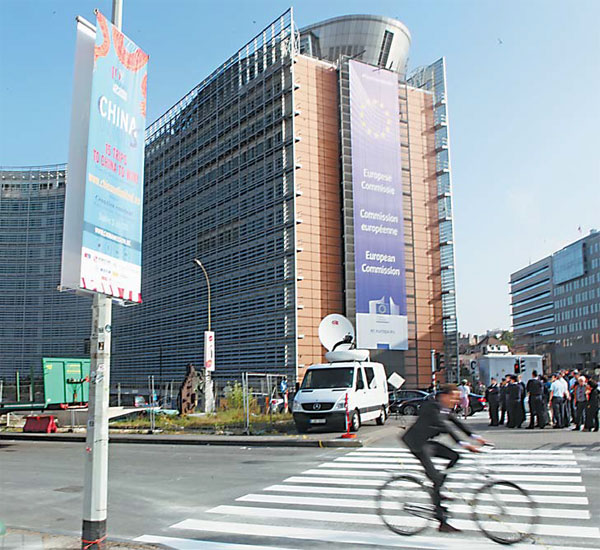Grand-plan synergy
Updated: 2015-06-26 06:35
By Fu Jing and Martin Banks(China Daily Europe)
|
|||||||||||
|
Posters promoting the 40th anniversary of EU-China relations at the EU headquarters in Brussels. Premier Li Keqiang is scheduled to talk about investment, financial collaboration and climate change with European counterparts on June 29 at summit. Fu Jing / China Daily |
China, the world's second-largest economy, has become one of the fastest-growing markets for European exports, and trade between China and the EU is worth more than 1 billion euros a day.
Beijing has two strategic plans in place: Internet Plus, and Made in China 2025, which is aimed at digitalizing the country's economic structure, promoting green growth and supporting innovative Chinese industry.
Participants in the Brussels seminar were told that a profound technological change is taking place in China, even as the EU talks of a "digital single market" and Germany presses on with its economic plan called Industry 4.0, both of which mirror China's goal's similar goals: Putting the Internet at the center of manufacturing processes and revitalizing economies.
The seminar heard that collaboration between China and Europe on their agendas would be a boon to the global flow of knowledge, technology and talent.
The 40th anniversary of China-EU diplomatic relations is being celebrated this year, and Yang says the relationship is poised to "gain further strengths and scale new heights of excellence".
Teemu Suila, chief operating officer of Rovio Entertainment, a Finnish video games company, says Europe is just at the start of its much talked of journey along the so-called digital highway.
However, he says: "Europe's vision of a true digital, single market needs rules fit for the digital age. Removing unjustified barriers to cross-border trading and access to digital content will energize the digital economy and enhance the digital experience of Europe's citizens. Similarly, ensuring that people's data and privacy are protected no matter where they are and what technology they use is essential, as boundaries between telecoms and Internet services increasingly blur."
A digital, single market is not just about getting Europe's economy back on its feet, he says.
"It's about refitting Europe with the skills, infrastructure and mindset required to make the most of the world economy's digital transformation. Failure to do so will not only be a lost opportunity, it will consign us to the economic slow lane for generations to come. It's that important."
There are two other aspects to a digitally powered, single market that are equally important and require urgent attention parallel to consumer-focused efforts, he says.
"First, Europe's infrastructure must be reshaped so that it can carry an explosion in the quantity of digital content that will soon be pumping through its networks. We have only seen the beginning of this so far.
"And second, we need to encourage all areas of Europe's economy and society to engage with the new technologies."
Related Stories
Easy answer for European job creation 2015-06-26 06:35
Europeans need to take Silk Road express 2015-06-26 06:35
Digital connections will deepen EU-China ties 2015-06-26 06:35
Today's Top News
EU, China must turn words into deeds
Greek doors are open to investment
Gunmen kill 27 in attack on Tunisian coastal resort
China opposes Dalai Lama UK appearances
Severed head found in French attack
France orders nationwide clampdown on Uber
No rest until sweeping victory against drugs, Xi says
High-tech seen as promising investment target
Hot Topics
Lunar probe , China growth forecasts, Emission rules get tougher, China seen through 'colored lens', International board,
Editor's Picks

|

|

|

|

|

|







